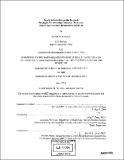| dc.contributor.advisor | Qing T. Zeng. | en_US |
| dc.contributor.author | Plovnick, Robert M. (Robert Matthew), 1976- | en_US |
| dc.contributor.other | Harvard University--MIT Division of Health Sciences and Technology. | en_US |
| dc.date.accessioned | 2005-09-27T17:12:00Z | |
| dc.date.available | 2005-09-27T17:12:00Z | |
| dc.date.copyright | 2004 | en_US |
| dc.date.issued | 2004 | en_US |
| dc.identifier.uri | http://hdl.handle.net/1721.1/28591 | |
| dc.description | Thesis (S.M.)--Harvard-MIT Division of Health Sciences and Technology, 2004. | en_US |
| dc.description | Includes bibliographical references (p. 67-70). | en_US |
| dc.description.abstract | Patients and their family members are increasingly turning to the Internet for health information. However, the search strategies consumers are using to obtain information are often unsuccessful. Since some patients are using the information they obtain to influence health decisions, it is increasingly important to identify strategies that aid consumer access to quality information to address their needs. Three different strategies to improve consumer health information retrieval are explored in this thesis, and suggestions for the application of these tactics and incorporation into healthcare delivery are discussed. Consumers have the option to choose between medically specific web sites and generic search engines with the whole Internet as their search space. For this project, a rigorous comparison of Internet searches in these two scopes was conducted to determine which search scope provides better returns. No statistical difference was found between the two different scopes, but several pros and cons of each were identified. Queries generated by consumers to initiate a free-text Internet search are often too short or too general to be effective. Additionally, consumers often employ vocabulary that does not match the terminology of health content. For this research, reformulation of original consumer queries using professional terminology was explored. A trend was noted towards increased search precision when substitutions were provided for lay terms, abbreviations, and acronyms, though performance often worsened when reformulated queries contained ill-fitted or arcane terminology. It is essential to study information needs to devise strategies to support consumer health information retrieval. The specific needs of asthma patients | en_US |
| dc.description.abstract | (cont.) and the extent they can be met by Internet resources are the focus of the final chapter of this thesis. To ascertain their information needs, asthma patients were interviewed before and after a clinical visit. The answers to these needs were then sought in a website limited to quality asthma content. Though many of the questions are answered during a clinical visit, a large proportion of patients leave the clinic with unanswered questions. Half of the needs expressed by patients were answered by the website. | en_US |
| dc.description.statementofresponsibility | by Robert M. Plovnick. | en_US |
| dc.format.extent | 75 p. | en_US |
| dc.format.extent | 3575524 bytes | |
| dc.format.extent | 3583265 bytes | |
| dc.format.mimetype | application/pdf | |
| dc.format.mimetype | application/pdf | |
| dc.language.iso | en_US | |
| dc.publisher | Massachusetts Institute of Technology | en_US |
| dc.rights | M.I.T. theses are protected by copyright. They may be viewed from this source for any purpose, but reproduction or distribution in any format is prohibited without written permission. See provided URL for inquiries about permission. | en_US |
| dc.rights.uri | http://dspace.mit.edu/handle/1721.1/7582 | |
| dc.subject | Harvard University--MIT Division of Health Sciences and Technology. | en_US |
| dc.title | Health information on the Internet : strategies for assessing consumer needs and improving consumer information retrieval | en_US |
| dc.type | Thesis | en_US |
| dc.description.degree | S.M. | en_US |
| dc.contributor.department | Harvard University--MIT Division of Health Sciences and Technology | |
| dc.identifier.oclc | 57509021 | en_US |
